A new paper as been published in Elsevier investigating the value of logged tropical forests. The field work was conducted in communities through interviews and ranking exercises around logged forest in Sabah, Malaysia, and community members’ provided valuation of Ecosystem Service. The study presents three key findings: 1. Clean water, clean air, regulation of temperature, flood and erosion are the Ecosystem Services ranked as the most important by all community members regardless of their spatial and socio-demographic backgrounds, 2. Prioritisation for other Ecosystem Service varied according to members’ age, gender, ethnicity, dependence on forest resources and distance to forest, 3. Community members’ priorities for Ecosystem Service align with the ecological literature that these services are retained by logged forest. These interesting results emphasise the need to promote people-centred approaches to design sustainable conservation policies of logged forests in Sabah. Read the full publication here.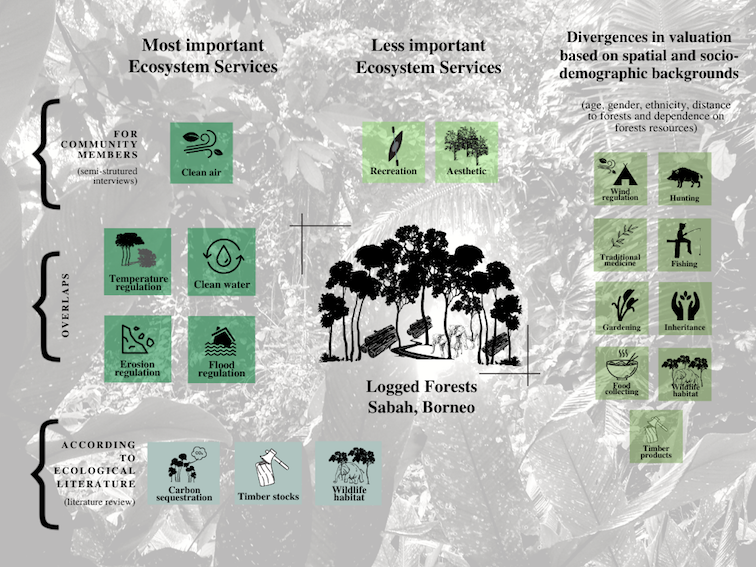
Category: News
TESSA Training Programme in the Central Forest Spine – First Training Session Completed!
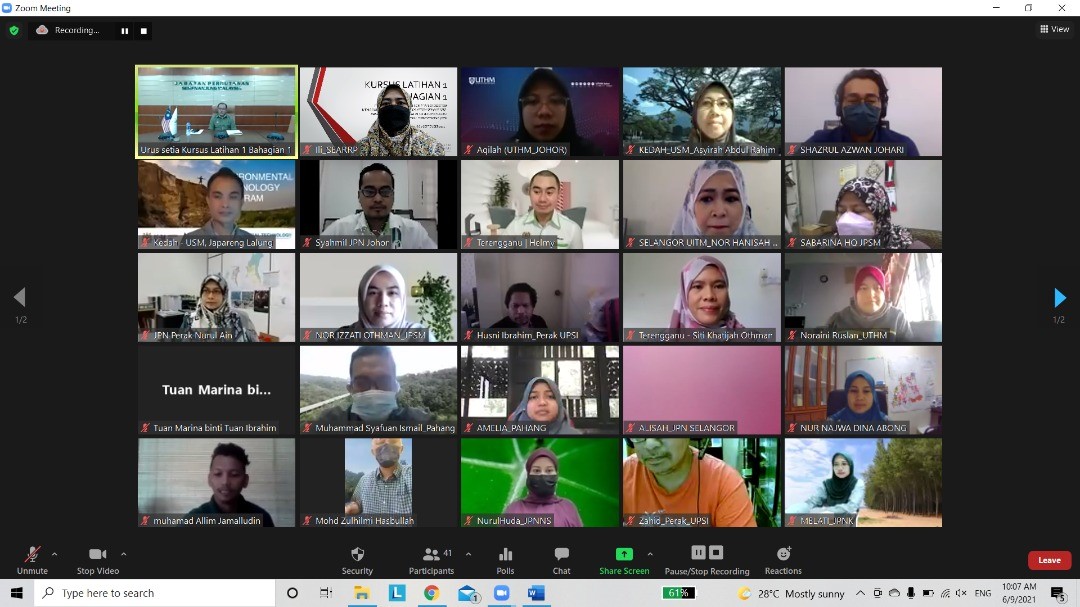
Online TESSA Training Course with Project Partners
With the support from Yayasan Hasanah and in collaboration with the Federal Department of Peninsular Malaysia (FDPM) and State Forestry Departments, SEARRP has started our first project in Peninsular Malaysia: Ecosystem Services in the Central Forest Spine (CFS) – Enabling Key Actors to Identify and Assess Natural Capital and Conservation Value Through the Use of TESSA.
This new project is based in one of the largest forest landscapes in Malaysia called the Central Forest Spine (CFS). The CFS is home to thousands of animal and plants species and provides vital ecosystem services for the surrounding communities. Despite the importance of this landscape, the area faces threats due to high demand of natural resources and the rapid urbanisation of the area. This three year project, which commenced in June 2020, aims to strengthen the conservation and restoration of this essential forest by training key stakeholders to identify and assess ecosystem services using a Toolkit for Ecosystem Service Site-based Assessment (TESSA). TESSA provides accessible guidance on low-cost methods for how to evaluate the benefits people receive from nature at particular sites in order to generate information that can be used to influence environmental decision making, and enable key actors to identify and assess natural capital and conservation value of forests.
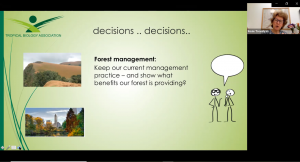
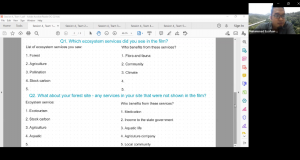
Despite all the uncertainties and challenges presented by Covid-19, we successfully completed Part 1 of our TESSA Training Programme virtually for our budding Malaysian TESSA Project Leaders who are from the State and Federal Forestry Departments, local NGOs and partners from universities.
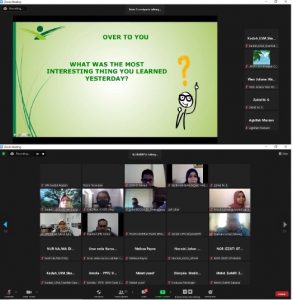 The 1.5 day online training covered the basic concepts of ecosystem services and TESSA, gave participants the opportunity to evaluate key ecosystem services and identify the challenges faced in their protected areas within the Central Forest Spine.
The 1.5 day online training covered the basic concepts of ecosystem services and TESSA, gave participants the opportunity to evaluate key ecosystem services and identify the challenges faced in their protected areas within the Central Forest Spine.
It was a great session with an exchange of ideas and increased knowledge of the value of forest conservation in Malaysia with helpful input from our expert trainer Dr Rosie Trevelyan from the Tropical Biology Association, UK.
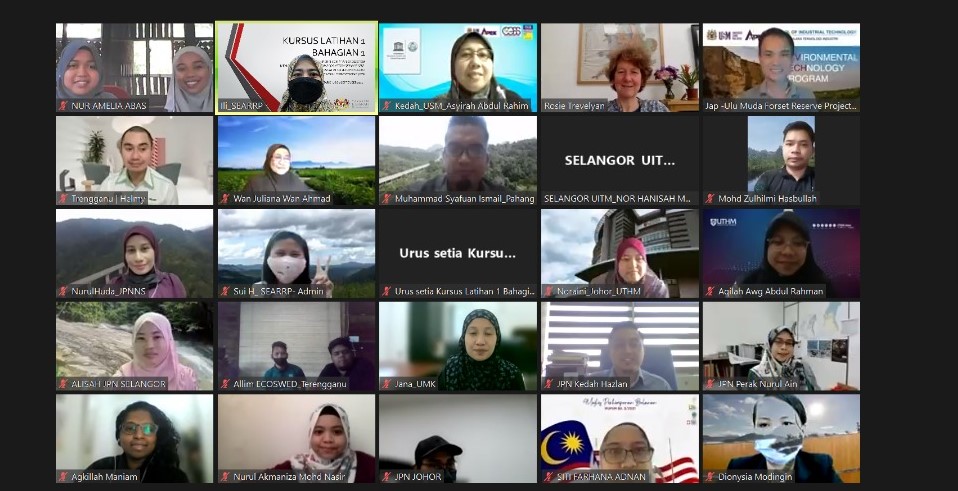
Online TESSA Training Course with Project Partners
SEARPP has formally joined the Palm Oil Innovation Group (POIG) as a member
SEARPP has formally joined the Palm Oil Innovation Group (POIG) as a member, and has committed to contributing to the goals and initiatives led by POIG. As a POIG member, SEARPP is working to find solutions to the challenges faced by the palm oil industry. SEARPP supports using responsible palm oil as a means for driving transformation in the palm oil industry so that it benefits both nature and people. SEARRP is excited to be a member of POIG and looks forward to our continued work facilitating scientific research that addresses the major environmental issues facing the tropics: plantation development, habitat restoration, and climate change.
To learn more about POIG and the POIG Charter requirements please visit: www.poig.org.
To learn more about SEARRP’s project visit: https://www.searrp.org/projects/

Partner collaboration for Yayasan Haji Zainuddin funded project ‘Building capacity to deliver a community-focused environmental education programme in Sabah’
With support from Yayasan Haji Zainuddin, SEARRP in partnership with Swansea University Science for School Scheme, Sabah Environmental Education Network and Partners of Community Organisations (PACOS) Trust, will co-develop Environmental Education (EE) modules and deliver capacity building to local EE practitioners and educators. This one-year project aims to bring together scientists, EE and community specialists in order to develop an EE toolkit that consists of modules, materials, handbooks and hands-on activities in the key environmental areas of agricultural sustainability, riparian reserves and water quality, and maintaining biodiversity. The project will then use this EE toolkit to train and empower local EE practitioners and educators through an intensive “train-the-trainers” pilot programme.
To ensure that this project is relevant to rural communities in Sabah, an essential aspect is to engage with partner organisations, in order to get their support and learn from their expertise. SEARRP recently had the opportunity to meet with Hutan Environmental Awareness Programme (HEAP) team, which is based on the Kinabatangan River in the village of Sukau, to learn from their extensive experience conducting EE programmes and to gauge their interest in participating in our train-the-trainer pilot programme. HEAP started their Environmental Education programme in 2003 with the aim of raising awareness amongst communities in Sabah about the importance of orang-utans and other wildlife and the need to protect and manage their fragile environment. HEAP initially started their EE outreach in the Kinabatangan area, but have expanded their reach across the state of Sabah over the past 15 years. SEARRP is looking forward to working with HEAP, and the larger Hutan team, on this project and are very grateful for the help and insight that they will bring to the train-the-trainers programme scheduled for later this year.
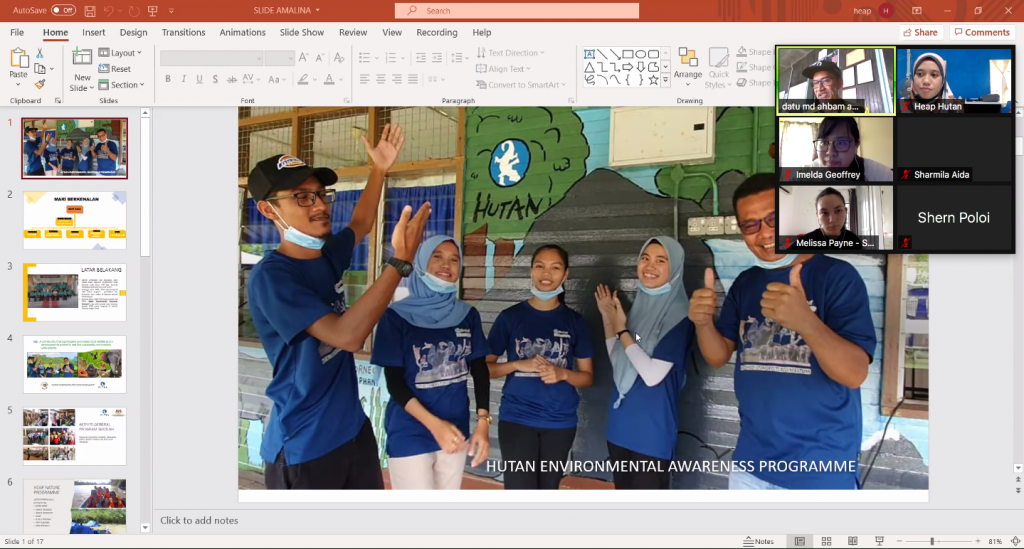
YHZ Environmental Education collaboration meeting with Hutan Environmental Awareness Programme (HEAP) team
After our meeting with HEAP, SEARRP had a follow-up engagement meeting with project partner PACOS trust. PACOS is a community-based organisation that is dedicated to empowering indigenous people in Sabah. PACOS has been involved with this project from the start, and has offered helpful advice and plenty of guidance for outreach to rural communities across Sabah. This meeting was focused on the content of the Environmental Education materials that we are creating, to ensure that they are inline with EE materials that PACOS has used before and to check if our initial module ideas are relevant to local communities. We are incredibly thankful for the support from both of these organisations and we are looking forward to working with them more in the months to come.
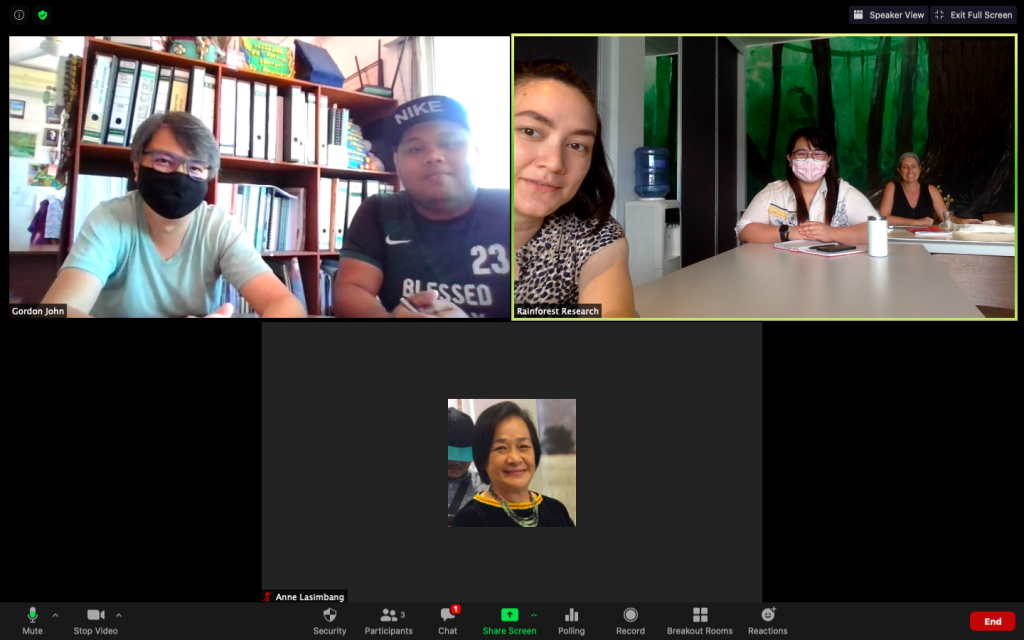
Collaboration meeting with YHZ Environmental Education project parter PACOS
Latest SEnSOR science for policy brief on smallholder pre-conditions for certification out now!
The newest SEnSOR research policy brief is ready to view! Led by Dr Rosa de Vos at Wageningen University, this study explores the backgrounds of certified smallholders to determine which pre-conditions allow smallholders to engage with RSPO certification. Researchers developed smallholder groupings by reviewing the literature, and interviewed group managers of certified smallholders as well as certification facilitators (the organisations that help smallholders to become certified) to understand the opportunities and challenges for different types of smallholders in accessing certification.
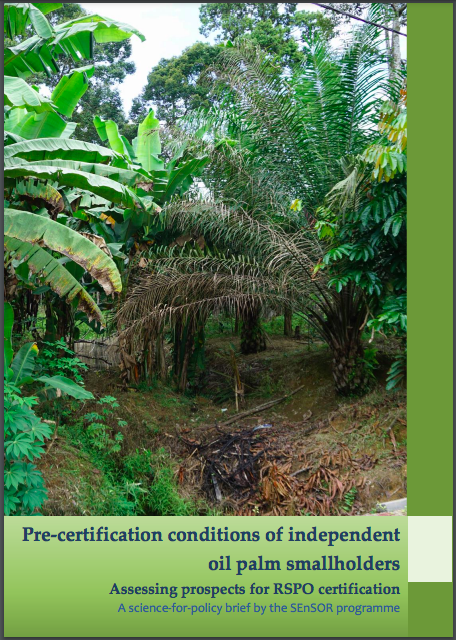
Smallholder Pre-Condition Policy Brief available here
New research from the SEnSOR Project investigates whether RSPO certification makes a difference to smallholder yields!
New research from the SEnSOR project team has found that RSPO certified smallholders have better management practices and higher yields, but could not prove that RSPO certification was the causal factor.
The study, led by Dr Rosa de Vos at Wageningen University, compared the management practices and yields of certified and uncertified oil palm smallholder groups in Central Kalimantan, Indonesia. She found that the planting material and fertiliser use was better in certified smallholders, who also produced significantly higher yields. However, it was not clear whether this was a result of RSPO certification, and it is likely that better pre-certification conditions, particularly strong group organisation, contributed both to better agricultural practices as well as making certification more accessible.
The article is published in Environmental Research Letters and the full report can be accessed here.
New simplified tropical forest assessment tool found to be highly effective at estimating forest condition
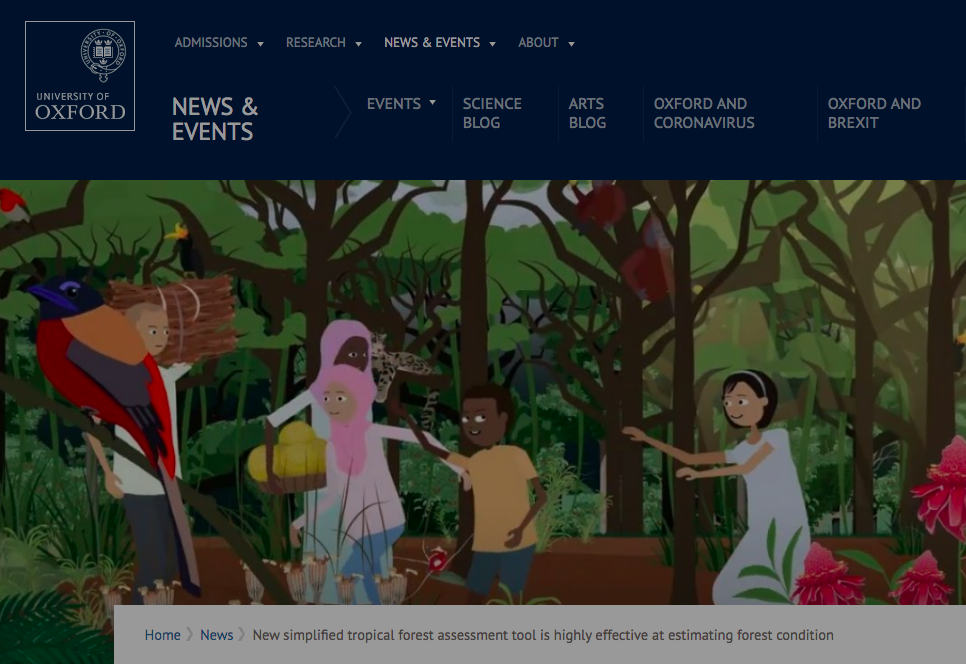
New simplified tropical forest assessment tool is highly effective at estimating forest condition University of Oxford
New collaborative research led by the University of Oxford, and published this week in Ecological Solutions and Evidence, shows that a simple tropical forest assessment tool can robustly estimate forest condition. The Forest Integrity Assessment (FIA) tool has demonstrated high levels of accuracy with traditionally collected scientific data sets to correctly identify biodiversity, forest structure and ecosystem functioning.
The FIA tool, which was originally developed by the High Conservation Value Resource Network (HCVRN), is designed to enable forest managers and other users with no prior experience in forestry or conservation to assess and monitor the condition of tropical forest conservation areas. The FIA tool requires no taxonomic knowledge, time-consuming measurements, expensive equipment or inaccessible satellite technologies, only simple yes or no answers to questions. Often conservation efforts are hampered by limited knowledge, experience and resources, an issue that the FIA tool aims to address. This tool will allow communities, companies, charities and individuals who are responsible for looking after natural forests, to provide accurate and invaluable information about forests outside of protected areas.
SEARRP’s Assistant Director of Knowledge Exchange, Dr Jennifer Lucey from Oxford’s Department of Zoology, led the collaborative research effort with the Universities of Northumbria, York, Leeds and Sheffield, along with partners, the HCVRN, South East Asia Rainforest Research Partnership and Wilmar International. Additionally, Dr Lucey used funding from an Impact Award that she received to create an animated video – ‘How do you estimate the condition of a forest?’ – that effectively explains the importance of forests and forest quality, and details how to recognise signs of a healthy forest and how these differ from forests that have been degraded.
With innovation follow-on funding from UKRI, Dr Lucey is now leading a project in collaboration with industry and NGO partners to develop the FIA tool into a smartphone application. The app will further enhance the accuracy of forest monitoring, with the aim of reducing the variations in responses which was a potential issue highlighted by the study.
Dr Lucey said: ‘We hope that the FIA smartphone app will enable forest stewards from diverse backgrounds to easily and effectively manage their conservation areas, maintaining and enhancing the biodiversity, carbon storage and other important ecosystem services that tropical rainforests provide.’
For the full press release of this article please visit Oxford University’s website.
For further information and interview requests please contact Jennifer Lucey at: Jennifer.lucey@zoo.ox.ac.uk Or Andrew Suggitt at: andrew.suggitt@northumbria.ac.
Together SEARRP and Partners have completed the Inception Workshops for the Hasanah Ecosystem Services Project in the Central Forest Spine.
A series of Inception Workshops held throughout March and April 2021, to engage with Central Forest Spine (CFS) stakeholders to introduce the Hasanah Project on “Ecosystem Services in the CFS”, as well as the Toolkit for Ecosystem Services Site-based Assessment (TESSA), have been completed. The SEARRP team, together with the Forestry Department of Peninsular Malaysia, successfully organised workshops in the eight CFS States – Perak, Selangor, Pahang, Terengganu, Negeri Sembilan, Johor, Kedah and Kelantan. This project will build the capacity of State Forestry Departments and other CFS stakeholders to facilitate identifying and assessing ecosystem services using the TESSA toolkit. For the next step, the project team will further engage with participants who are interested in being involved in the capacity building programme and the implementation of ecosystem services assessment in the CFS. For more information about this exciting project visit here.
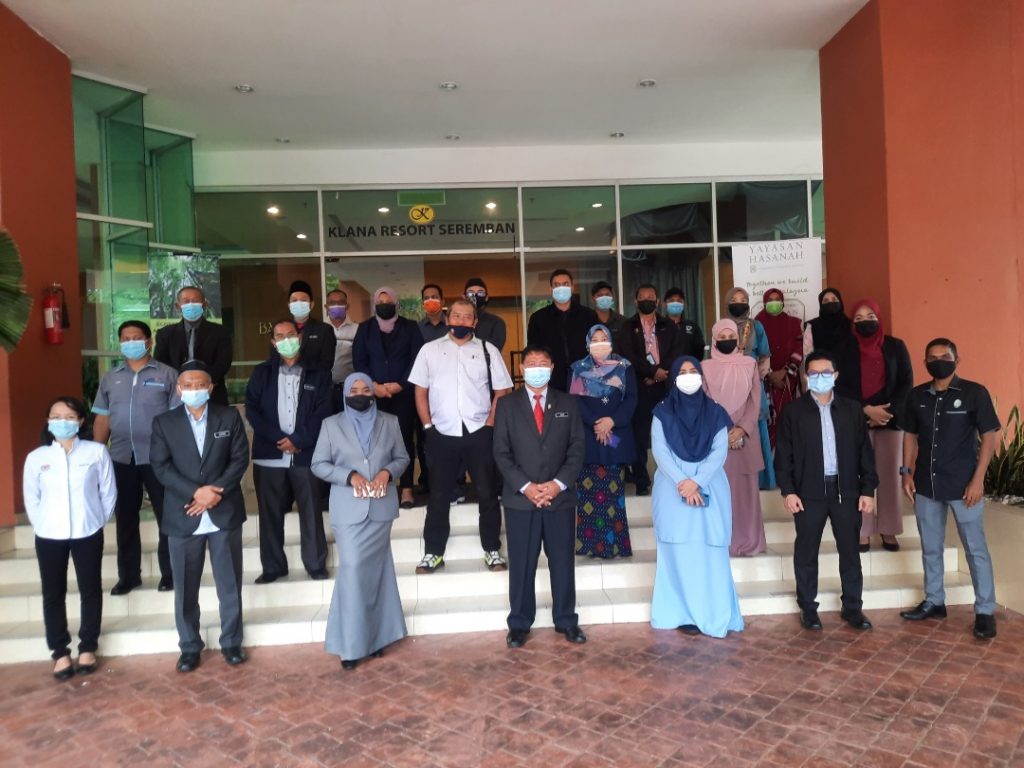
Inception Workshop with Central Forest Spine (CFS) stakeholders
Daily Express interview with SEARRP Director Dr. Glen Reynolds on the Stability of Altered Forest Ecosystems (SAFE) Project
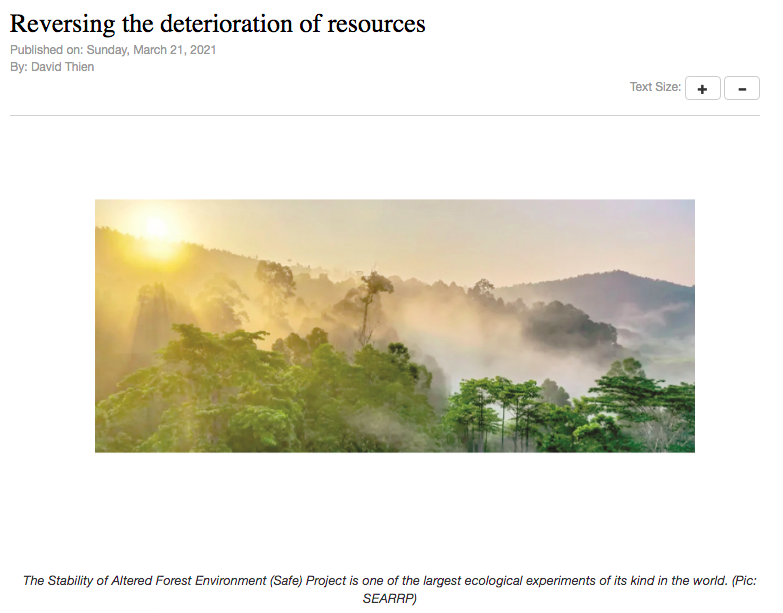
Daily Express article – Reversing the deterioration of resources
SEARRP manages a suite of major, strategic field projects that allow scientists to address critical issues in forest conservation, habitat restoration, the impacts of a changing climate and sustainable plantation management. In a recent interview with the Daily Express, Dr Glen Reynolds the Director of SEARRP, talked about the importance of one of our large, ongoing projects – the Stability of Altered Forests Ecosystems (SAFE) project. The SAFE project conducts large-scale experiments to understand how logging, deforestation, forest fragmentation and oil palm plantations are affecting the functioning of tropical rainforests. In the interview, Dr Reynolds spoke candidly about the importance of changing the way we manage forest, and non-forest land and the urgent need for biodiversity conservation to be mainstreamed into forest management best practices in all forest types. “As humanity continues to grapple with the accelerating rate of biodiversity loss, sustainable agriculture is becoming very essential in reversing trends that lead to the overall deterioration of our natural resources.” The potential impact of the SAFE Project is global and far-reaching. The findings of this study are helping scientists to design landscapes that maintain agricultural production at reduced cost to biodiversity. Please read the full article here.
